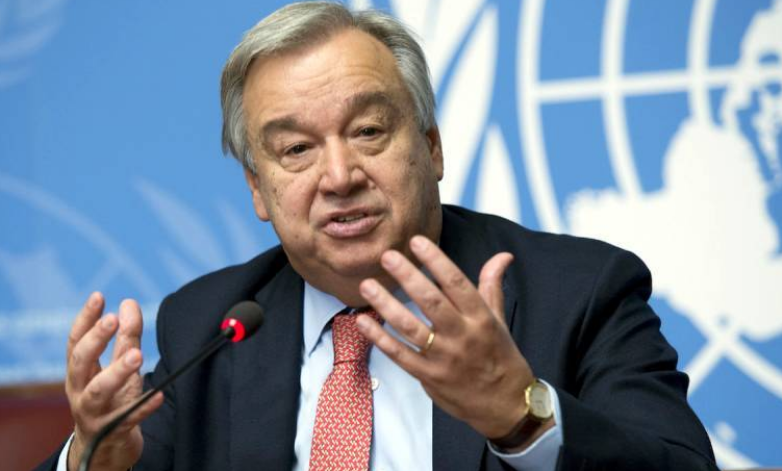New York (Web Desk/Agencies): United Nations (UN) Secretary-General Antonio Guterres has expressed a sense of cautious optimism regarding the future of the Middle East, specifically in relation to Syria.
Speaking in Pretoria, South Africa, where he was meeting government officials in connection with the country’s presidency of the G20, Guterres referred to the possible end of President Bashar al-Assad's regime as a potential source of hope for the region.
He emphasized the importance of a peaceful and inclusive political transition in Syria, one that fully respects the rights of minorities and restores the country’s territorial integrity.
"The UN is totally committed to supporting a smooth transition of power, with an inclusive political process in which the rights of all minorities will be fully respected, and paving the way towards a united sovereign Syria with its territorial integrity fully reestablished," Guterres told reporters.
He continued by expressing confidence in the ability of the Syrian people to shape their own future: "I fully trust Syrian people to be able to choose their own destiny."
Reflecting on the evolving political landscape of the region, the UN chief noted the significant shifts in regional power dynamics.
He highlighted the importance of reaffirming the Palestinian people’s right to self-determination and statehood, underscoring that this cause must remain a key priority on the international agenda.
At the same time, Guterres pointed to some positive developments emerging from the region, particularly with regard to the fall of the Syrian dictatorship. "But we also see some signs of hope, and signs of hope mainly coming from the end of the Syrian dictatorship," he said.
The UN chief further explained that his Special Envoy for Syria, Geir Pedersen, is in active dialogue with all relevant stakeholders, working toward a political solution for Syria.
Guterres reiterated his belief in the capacity of the Syrian people to determine their own fate, urging the international community to support efforts for a unified Syria.
"The alternative doesn’t make any sense," the UN chief emphasized. "Syrians had enough divisions. It’s time for unity, and it’s time for the reestablishment of its territory."
The UN chief was also asked about Israel’s further advancement into the Golan in southwest Syria, which it has occupied for decades, and a response to Prime Minister Benjamin Netanyahu reportedly saying that the region will be part of Israel ‘for eternity’.
"The concept of eternity is difficult to define," he stated, referring to Israeli claims of permanent control. He added, "And so, I would say that eternity would not solve the problem of the violations of the law."
He noted that the Golan is occupied by Israel, ‘but that occupation is not internationally recognized. And so, I would say that eternity would not solve the problem of the violations of the law’.
Meanwhile, the humanitarian situation in Syria remains dire, with Israeli airstrikes and localized conflicts continuing to disrupt civilian life.
The UN Office for the Coordination of Humanitarian Affairs (OCHA) expressed concern over the risks posed by explosive ordnance, with more than 50 minefields identified across the country in the past week. This is significantly hindering the movement of civilians and impeding the delivery of essential aid and services.
Despite these challenges, humanitarian organizations are persevering with their efforts across Syria. In areas like Homs and Hama, aid operations are gradually resuming, and essential services such as water stations have been reactivated to assist local populations. However, insecurity in the northeast remains a serious barrier to further progress.
As winter approaches, the UN is seeking urgent additional funding to support humanitarian operations, especially as heavy rain and snow could lead to widespread flooding. Despite these difficulties, aid workers have successfully distributed thousands of tents, mattresses, blankets, and solar lamps to those displaced in areas like Tabqa and Raqqa.
Separately, Tom Fletcher, the UN Humanitarian Coordinator, stressed the importance of continued humanitarian engagement in Syria. "Much is in flux in Syria, but vital aid must continue to flow and critical health and other services must be sustained," he wrote in a social media post.
He concluded by reaffirming the UN’s commitment to providing support to Syrian civilians wherever needed.


